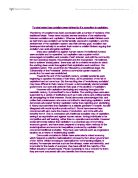Towards the end of the twentieth century, socialist academia were beginning to question the ideas of Karl Marx, as his prediction of the fall of capitalism had not come true. But the resulting rise of ‘evolutionary socialists’, may have differed in their means of power; a democratically elected socialist government, but were still united in their goal of the abolition of capitalism.
However with capitalism developing and maturing throughout the twentieth century, it proved itself to be a flexible. The working class were also supported by a variety of institutions such as trade unions and political parties, all campaigning for their interests. Social democrats acknowledged this, and unlike their predecessors who were committed to destroying capitalism, social democrats advocated ‘taming’ capitalism rather than rejecting and abolishing it. Many have admitted that capitalism is a reliable generator of wealth, but still disagreed with social injustice produced by it. Some have seemed less concerned with who owns the means of production, and more with who benefits from it. This is contrasted with traditional socialists view of capitalism, seeing it as exploitative and against human nature, forcing individuals to be competitive and self seeking, rather than co-operative and sociable. However social democrats believe that capitalism is a practical way of promoting economic growth, and have been prepared to employ other methods to the social injustices and economic inequalities produced by capitalism that concerned traditional socialists. They have use methods such as progressive taxation as a means of redistributing wealth
Democratic socialists in Britain have advocated a mixed economy, which featured a selective nationalisation process by the Labour government of the 1950’s. Whilst choosing to nationalise the ‘commanding heights of industry’ for example services such as the railways, water and electricity, and to provide for the needs of everyone, they have still left the majority of the British industry in private hands. Private ownership is not a concern for them; they are more concerned with who benefits from the economy.
Social democrats have accepted a privately owned economy, they have stressed that it is not who owns the economy that concerns them, but who benefits from it.
Although some have criticised Blair’s third way rhetorics as merely responding to the electoral pressures. He still aims to provide social justice, although his methods and principles appear to be a departure from traditional socialists. Blair has been keen to embrace capitalism, and has been condemned by critics as sympathizing with the modern liberal ideology. His ‘New Deal’ approach to inequalities in society
In conclusion, the industrialisation of the twentieth century has been marked by the development of capitalism as a stable and flexible system. In reaction to this, socialist has also developed, redefining itself as an ideology, particularly in concern of socialist’s relationship with capitalism, rather than it’s original position against capitalism.







